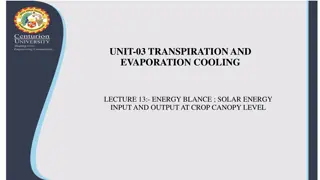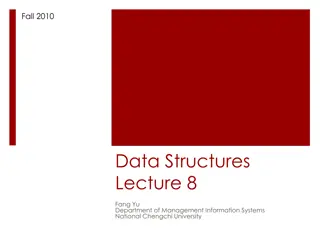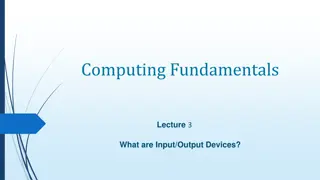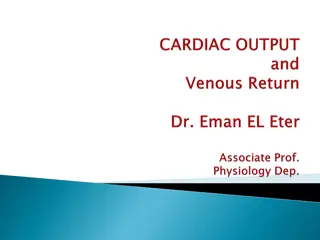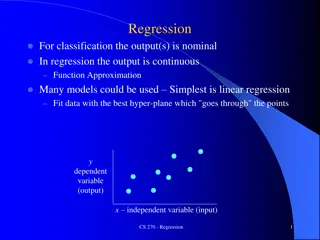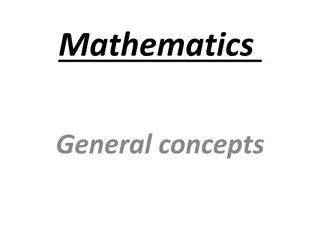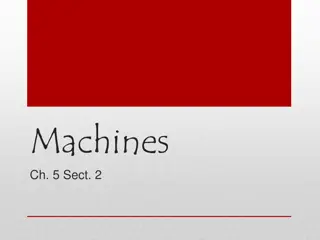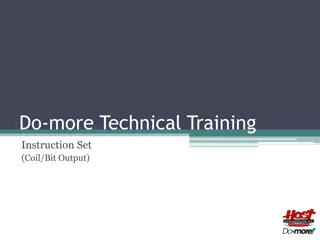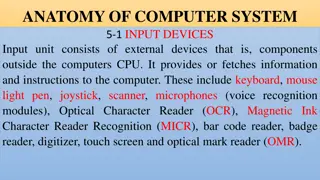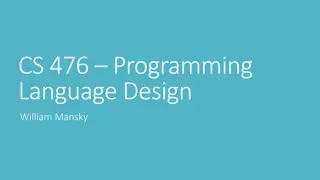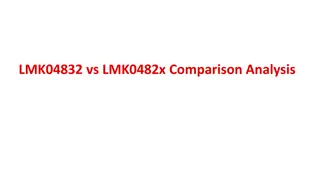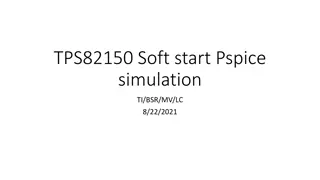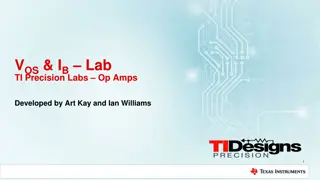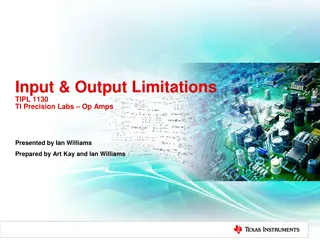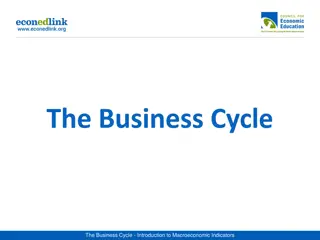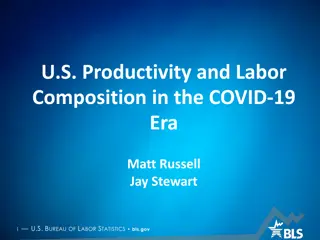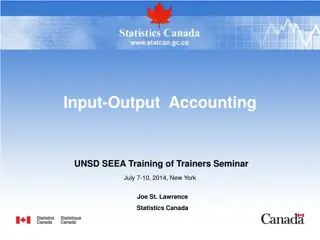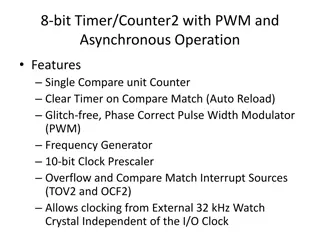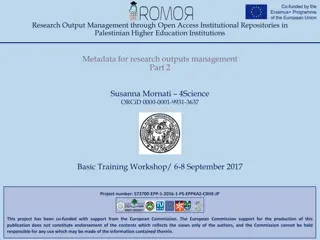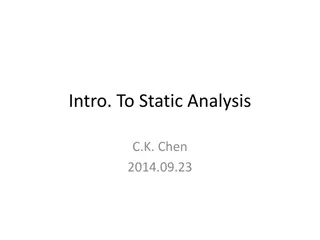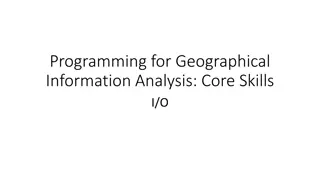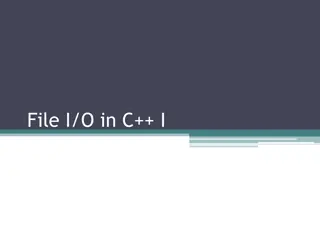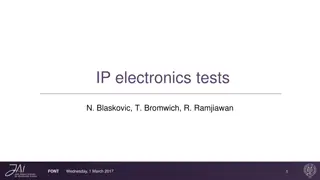Understanding Computer Hardware and Software Fundamentals
A computer is a programmable electronic device consisting of hardware and software that enables input, processing, storage, and output of information. This includes characteristics, basic components, application software, and advanced processing stages like ALU, input/output devices, control unit, R
0 views • 14 slides
Output Devices UNIT#4
Output devices in computing play a crucial role in displaying visual information to users. Monitors, including CRT, LCD, and LED types, provide visual output by showing pictorial forms on screens. Each type has distinct characteristics and resolutions. Graphics adapters help computers render graphic
1 views • 82 slides
Relevance of Countercyclical Fiscal Policy and Fiscal Acyclicality
This literature review examines the effectiveness of countercyclical fiscal policies in stabilizing output and enhancing welfare, with a focus on the correlation between public spending cycles and GDP cycles. The study analyzes examples from Sweden and Argentina to showcase the impact of fiscal poli
2 views • 29 slides
Solar Energy Balance in Crop Canopy: Understanding Input and Output
Solar energy plays a crucial role in the metabolic processes of plants, particularly in photosynthesis and transpiration. The input and output of solar energy at the canopy level impact the growth and productivity of crops, influenced by factors like leaf characteristics and plant density. Enhancing
3 views • 6 slides
Understanding Input-Output Models in Economics
Input-Output models, pioneered by Wassily Leontief, depict inter-industry relationships within an economy. These models analyze the dependencies between different sectors and have been utilized for studying agricultural production distribution, economic development planning, and impact analysis of i
8 views • 7 slides
Understanding the Production Function in Economics
The production function is a vital mathematical equation that determines the relationship between factors of production and the quantity of output. This function plays a crucial role in optimizing production efficiency by assisting in decision-making related to input levels, output quantities, and c
0 views • 9 slides
Understanding Algorithm Analysis: Key Concepts and Methods
Exploring algorithm analysis through topics like input-output analysis, running time evaluation, experimental studies, limitations, theoretical analysis, pseudocode explanation, and control flow details. Delve into how algorithms perform based on input sizes, types, and different analytical methods
1 views • 35 slides
Understanding Input and Output Devices in Computing
In computing, input and output devices play a crucial role in enabling communication between users and computers. Input devices are used to enter data into a computer, while output devices display or provide the results of processed information. Common input devices include keyboards, mice, and joys
0 views • 17 slides
Comprehensive Cost Management Training Objectives
This detailed training agenda outlines a comprehensive program focusing on cost management, including an overview of cost management importance, cost object definition, cost assignment, analysis, and reporting. It covers topics such as understanding cost models, cost allocations, various types of an
2 views • 41 slides
Understanding Basic Input/Output Operations in Computer Organization
Basic Input/Output Operations are essential functions in computer systems that involve transferring data between processors and external devices like keyboards and displays. This task requires synchronization mechanisms due to differences in processing speeds. The process involves reading characters
0 views • 11 slides
Understanding Cardiac Output and Venous Return in Cardiovascular Physiology
Cardiac output, stroke volume, end-diastolic and end-systolic volumes play vital roles in cardiovascular function. Factors affecting cardiac output include physiological conditions and pathological states like hyperthyroidism and myocardial infarction. Venous return, controlled by mechanisms like Fr
0 views • 27 slides
Understanding Regression in Machine Learning
Regression in machine learning involves fitting data with the best hyper-plane to approximate a continuous output, contrasting with classification where the output is nominal. Linear regression is a common technique for this purpose, aiming to minimize the sum of squared residues. The process involv
1 views • 34 slides
Understanding Functions and Graphs in Mathematics
Functions are a fundamental concept in mathematics used to describe relationships in the real world. They can be represented through equations, graphs, tables, or verbal descriptions. A function maps elements from a domain to a range, where each input has a unique output. The domain encompasses all
0 views • 4 slides
Troubleshooting Tips for AASHTOWare Bridge Design & Rating 3D FEM Analysis
Explore hardware recommendations, factors affecting analysis speed, and tips for successful analysis in AASHTOWare Bridge Design & Rating (BrDR) 3D FEM Analysis. Learn about non-zero moments, degrees of freedom, shell elements, live loading increments, and analysis output selections for optimal perf
0 views • 26 slides
Understanding R Markdown: A Comprehensive Guide to Statistical Analysis
R Markdown is a powerful tool for statistical analysis, allowing you to create documents that combine text, code, and output in a seamless manner. This guide covers the basics of R Markdown, including its uses, process, sections, creating new files, interactive running of code, document knitting, ou
0 views • 24 slides
Association of Renal and Cerebral Near Infrared Spectroscopy with Low Cardiac Output in Single Ventricle Patients
Near-infrared spectroscopy (NIRS) has been studied in infants after Stage I palliation surgery to assess its association with low cardiac output and adverse outcomes. This retrospective study investigated postoperative cerebral and renal NIRS values in infants with single ventricle physiology. Resul
0 views • 13 slides
Understanding Machines: Work, Forces, and Efficiency
Machines play a vital role in making work easier by increasing force, distance, or changing the direction of applied force. Different types of machines like levers, pulleys, and inclined planes simplify work processes. Understanding input and output forces, as well as input and output work, is essen
1 views • 10 slides
Do-more Technical Training: Coil/Bit Output Instruction Set
Learn how to utilize the Coil/Bit Output Instruction Set in Do-more Technical Training. This set covers various functionalities including Unconditional END, Trailing Edge One-Shot, Output Reflection, Leading Edge One-Shot, Push On/Push Off, and Reset operations. Understand how each instruction works
0 views • 11 slides
Overview of Computer Input and Output Devices
Input devices of a computer system consist of external components like keyboard, mouse, light pen, joystick, scanner, microphone, and more, that provide information and instructions to the computer. On the other hand, output devices transfer information from the computer's CPU to the user through de
0 views • 11 slides
Understanding Input and Output in Programming: A Comprehensive Guide
This content provides detailed explanations and examples on input and output handling in programming, focusing on concepts such as I/O as State, typed output, and consuming input lists. It covers topics like using print statements, scanning inputs, and building output lists in programming languages.
0 views • 44 slides
Comparison Analysis of LMK04832 vs LMK0482x
General specifications comparison between LMK04832, LMK04828, LMK04821, and LMK04826 including parameters like VCO frequency range, maximum output frequency, input frequencies, PLL specifications, supply voltage, operating temperature, and output formats. Clock output formats, dividers, and delays d
0 views • 5 slides
Provenance Analysis of Algorithms - Understanding Data Dependencies
Exploring the concept of provenance analysis in algorithms to understand how output items depend on input items. This analysis goes beyond traditional activity logs, focusing on structured collections of items and exploring various applications for causal and quantitative analysis. The critical test
1 views • 16 slides
Soft Start Simulation Results for TPS82150 Power Module
Results of soft start simulations for TPS82150 power module show that the rise time for output voltage slightly exceeds the expected soft start time due to voltage ramping up to 0.8V only. Different scenarios for input voltage and output current levels are explored, highlighting the impact on rise t
0 views • 4 slides
Understanding Op-Amp Output Swing Limitations in Linear Applications
Explore the limitations of op-amp output swing in linear applications, focusing on the non-linear behavior when driven into saturation. Learn how open-loop voltage gain affects output swing and the implications of operating closer to the rails. Check datasheet specifications for op-amp constraints a
0 views • 5 slides
Precision Labs Op Amps Circuit Analysis
Explore a detailed analysis of a circuit utilizing Precision Labs Op Amps, developed by Art Kay and Ian Williams. Calculate total output voltage considering offset voltage and bias current, analyze typical and maximum values for OPA211 and OPA188, and simulate results for different configurations. G
0 views • 7 slides
Understanding Input and Output Limitations in Op Amps
Explore the various input and output limitations in TI Precision Labs Op Amps as presented by Ian Williams and prepared by Art Kay and Ian Williams. Delve into common mode voltage, voltage swing, data sheet parameters translation, input and output stages, examples of common mode voltage, and potenti
0 views • 15 slides
Understanding the Business Cycle in Macroeconomics
The business cycle refers to the fluctuations in an economy, with phases like peak, expansionary, trough, and contractionary. During expansionary phases, output increases, unemployment decreases, and inflation may rise. Conversely, contractionary phases see output decline, unemployment rise, and red
0 views • 6 slides
Understanding U.S. Labor Productivity Trends During COVID-19
Explore the impact of the COVID-19 pandemic on U.S. labor productivity and output growth through visual data representations and analysis. Gain insights into the changes in labor composition, hours worked, and real output growth in different industries from 2019Q4 to 2020Q4. Discover the sources of
0 views • 16 slides
CMIP6 Output Requests and Atmosphere/Land Fields Overview
This presentation deck outlines the CMIP6 output request presented at ACME All-Hands meeting in June 2017. It includes detailed information on various atmosphere and land fields that are both part of and not part of the ACME output, covering parameters like radiation, moisture, carbon flux, and vege
0 views • 8 slides
Overview of Input-Output Accounting and Economic-Environmental Integration
This content provides insights into input-output accounting, flow accounting, environmental-economic integration, and the integration of economic data. It covers topics such as the economy, natural resources, sector-wise analysis, flow of goods and services, and the relationship between supply and d
6 views • 23 slides
Understanding Timing Models in Cell Design Environments
Delve into the intricacies of timing models for cells in design environments, exploring factors affecting delay, output transitions, linear and non-linear models, and the use of table models in cell libraries to specify delays and timing checks. Discover how input transitions and output capacitance
0 views • 11 slides
8-bit Timer/Counter2 with PWM and Asynchronous Operation
The 8-bit Timer/Counter2 with PWM and Asynchronous Operation features single compare unit, glitch-free operation, phase-correct PWM, frequency generator, clock prescaler, interrupt sources, and external clocking options. It includes registers for control, counter, output compare, asynchronous status
0 views • 14 slides
Research Output Management in PS Higher Education: FAIR Metadata Principles
Research output management in higher education focuses on making scholarly output findable, accessible, interoperable, and reusable through the implementation of FAIR metadata principles. The digital ecosystem surrounding scholarly publications faces barriers like fragmented repositories, varied app
0 views • 22 slides
Comparative Analysis of Traffic and Revenue Risks in Priced Facilities
This presentation at the 14th TRB National Transportation Planning Applications Conference discusses the background, process, and importance of sensitivity and risk analysis in traffic and revenue forecasts for toll road projects. It covers how risk analysis helps quantify uncertainties, determine i
0 views • 31 slides
Introduction to Static Analysis in C.K. Chen's Presentation
Explore the fundamentals of static analysis in C.K. Chen's presentation, covering topics such as common tools in Linux, disassembly, reverse assembly, and tips for static analysis. Discover how static analysis can be used to analyze malware without execution and learn about the information that can
0 views • 54 slides
Industrial, Microbiological & Biochemical Analysis - Course Overview by Dr. Anant B. Kanagare
Dr. Anant B. Kanagare, an Assistant Professor at Deogiri College, Aurangabad, presents a comprehensive course on Industrial, Microbiological, and Biochemical Analysis (Course Code ACH502). The course covers topics such as Industrial Analysis, Microbiological Analysis, and Biochemical Analysis. Dr. K
0 views • 16 slides
Benefits of Probabilistic Static Analysis for Improving Program Analysis
Probabilistic static analysis offers a novel approach to enhancing the accuracy and usefulness of program analysis results. By introducing probabilistic treatment in static analysis, uncertainties and imprecisions can be addressed, leading to more interpretable and actionable outcomes. This methodol
0 views • 11 slides
Geographical Information Analysis Skills: I/O and Data Manipulation Using Python
Python programming for geographical information analysis covers core skills like input/output operations, built-in libraries, data types, and working with files. Learn about standard input/output, redirection of streams, and file manipulation in Python. Explore how to read and write files, interact
0 views • 55 slides
Understanding File Input/Output (I/O) in C++
File Input/Output (I/O) is an essential concept in C++ programming, allowing for interaction with files stored on secondary storage devices. This involves steps like including the fstream header file, declaring file stream variables, associating them with input/output sources, opening the file, perf
0 views • 19 slides
Anomalous IP Processing Electronics Diagnostic Tests
Repeating some anomalous IP processing electronics diagnostic tests on the first stage and the limiter. Tests include checking for unwanted harmonics in the frequency multiplier output and observing changes in the output power with varying input power. Issues with the output of the limiter diode and
0 views • 15 slides



